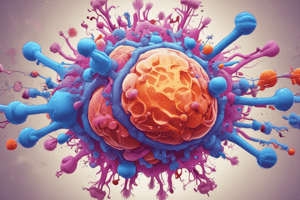Podcast
Questions and Answers
What is an advantage of using monoclonal antibodies?
What is an advantage of using monoclonal antibodies?
- They require extensive purification steps.
- They are suitable for detecting small antigens.
- They provide a constant source of antibodies. (correct)
- They can be obtained from multiple animal species.
Which type of antibody is typically used in immunoassays?
Which type of antibody is typically used in immunoassays?
- Chimeric antibodies
- Monoclonal antibodies (correct)
- Recombinant antibodies
- Polyclonal antibodies
What is a limitation of using polyclonal antibodies?
What is a limitation of using polyclonal antibodies?
- They require little purification steps.
- They provide a finite source of antibodies. (correct)
- They can be obtained from a single animal species.
- They are suitable for detecting small antigens.
Why are polyclonal antibodies often used for detecting large antigens?
Why are polyclonal antibodies often used for detecting large antigens?
What is a characteristic of monoclonal antibody production?
What is a characteristic of monoclonal antibody production?
What is a key difference in the source of monoclonal and polyclonal antibodies?
What is a key difference in the source of monoclonal and polyclonal antibodies?
What is a consequence of using polyclonal antibodies from different animals?
What is a consequence of using polyclonal antibodies from different animals?
Why are monoclonal antibodies often used in immunoassays?
Why are monoclonal antibodies often used in immunoassays?
What is a characteristic of antigens that are often detected using polyclonal antibodies?
What is a characteristic of antigens that are often detected using polyclonal antibodies?
What is a requirement for producing polyclonal antibodies?
What is a requirement for producing polyclonal antibodies?
Flashcards are hidden until you start studying
Study Notes
Monoclonal Antibodies
- Restricted to mouse cells
- Can be developed and grown in cell culture, which is quick and inexpensive
- Provides a lifelong source of antibodies with minimal purification needed
- Most commonly used in immunoassays
- Offers a constant source of antibodies
Polyclonal Antibodies
- Can be obtained from various animal species, as long as they are large enough
- Requires animal housing and strict regulations
- Provides a finite source of antibodies, as the animal will eventually die of old age
- The antibody source changes each time a new animal is used
- Requires purification of antibodies from other cell components
- Best suited for large antigens with changing epitopes, such as bacteria
Monoclonal Antibodies
- Restricted to mouse cells
- Can be developed and grown in cell culture, which is quick and inexpensive
- Provides a lifelong source of antibodies with minimal purification needed
- Most commonly used in immunoassays
- Offers a constant source of antibodies
Polyclonal Antibodies
- Can be obtained from various animal species, as long as they are large enough
- Requires animal housing and strict regulations
- Provides a finite source of antibodies, as the animal will eventually die of old age
- The antibody source changes each time a new animal is used
- Requires purification of antibodies from other cell components
- Best suited for large antigens with changing epitopes, such as bacteria
Studying That Suits You
Use AI to generate personalized quizzes and flashcards to suit your learning preferences.




